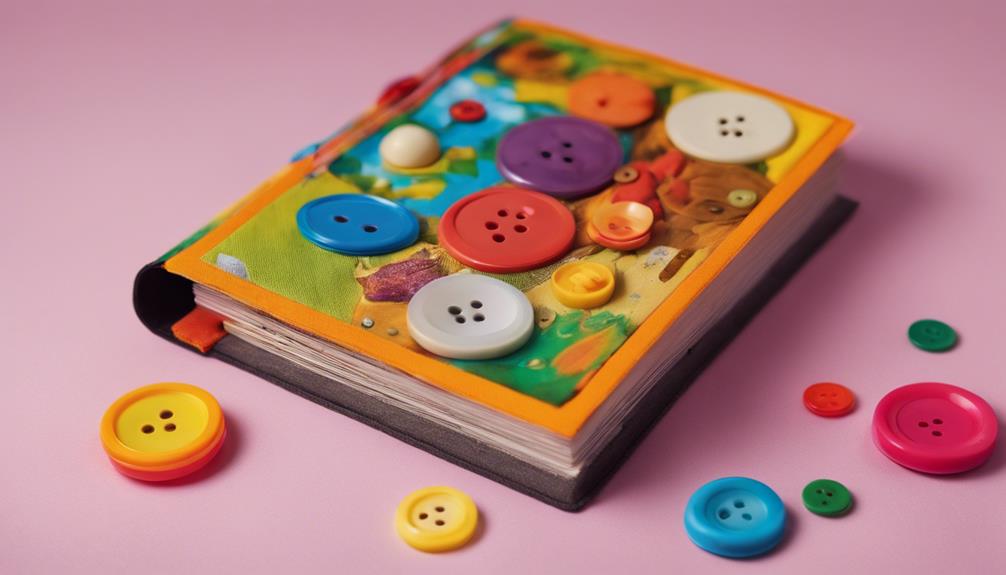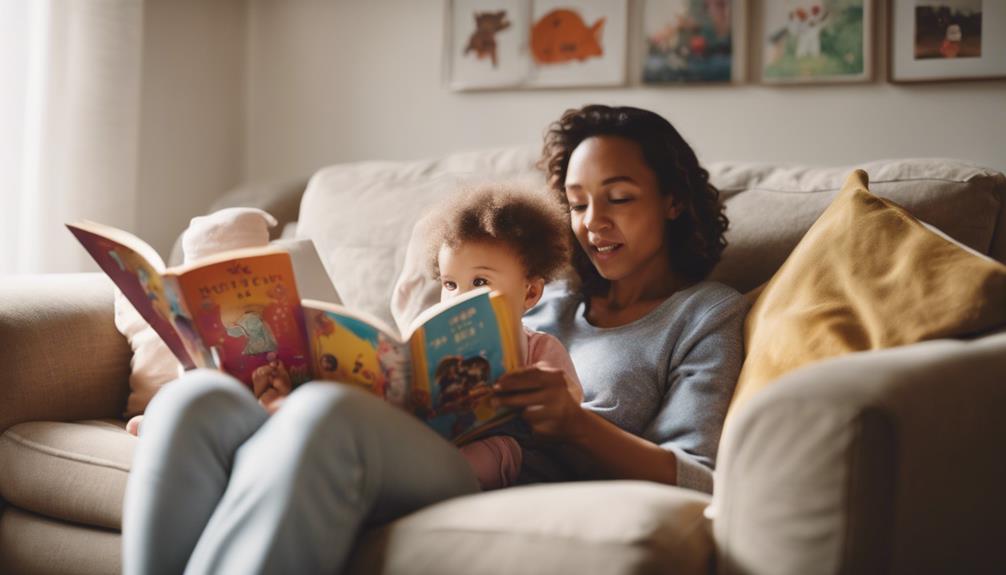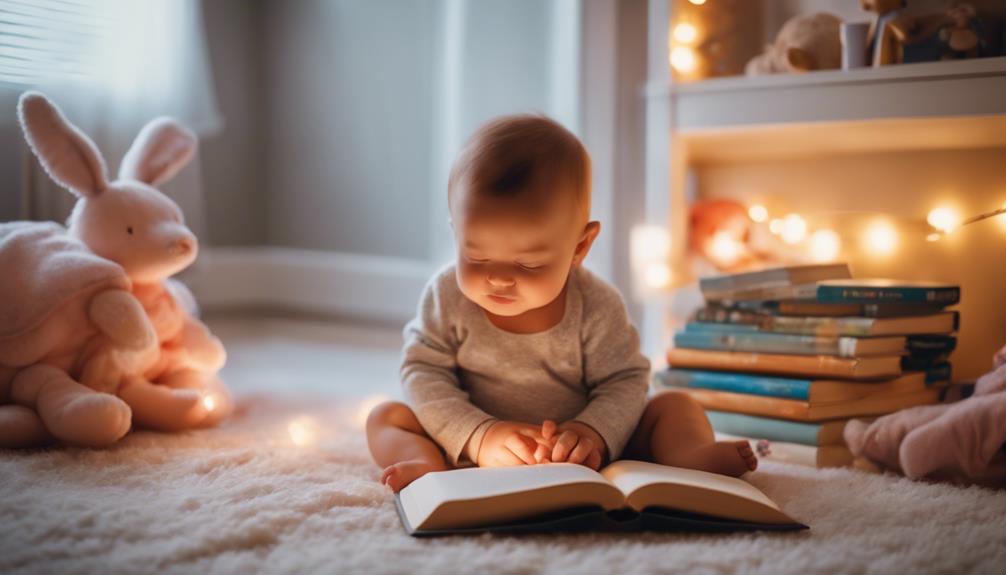You should start reading to your baby from an early age to improve language skills, cognitive development, and literacy. Early exposure to books plays a key role in shaping brain development and laying the foundation for future literacy skills. Reading aloud helps in stimulating language patterns, enhancing vocabulary, and promoting communication skills. Consider opting for interactive books with textures and rhymes to keep your baby engaged. Developing this habit early on contributes to cognitive growth and brings long-term benefits. For infants, choose books with high-contrast images, while toddlers may benefit from rhymes and interactive elements. Incorporating bedtime stories not only strengthens the bond between parent and child but also promotes relaxation. Start this practice early to instill a love for books and storytelling in your child. Discover more about fostering early literacy habits for your baby.
Key Takeaways
- Start reading to your baby from birth to promote language development.
- Reading early aids in brain development and literacy skills.
- Choose age-appropriate books with engaging features.
- Reading before bedtime can establish a relaxing routine.
- Regular reading sessions help build a strong parent-child bond.
Importance of Early Reading
Start reading to your baby early on to help build a strong foundation for their language development and future literacy skills. Early exposure to books plays an essential role in shaping your baby's brain development.
Through reading, your baby begins to absorb language patterns, enhancing their early literacy and vocabulary. As you read to your baby, you aren't only fostering a love of reading but also improving their communication skills.
The benefits of reading to your baby go beyond just words on a page; it extends to their sensory development as well. Babies explore books through touch and sound, engaging their senses and aiding in their overall sensory development.
Developmental Benefits of Reading

Reading to babies provides a multitude of developmental benefits, enhancing their cognitive, social, and linguistic skills from an early age. Early reading plays a vital role in language development, creating neural connections in the brain that pave the way for enhanced vocabulary building.
According to research, babies who are read to regularly exhibit larger vocabularies by age 3 compared to those who don't engage in such activities. Moreover, reading to babies also contributes to the development of fine-motor skills, social interactions, and problem-solving abilities.
These shared reading sessions not only impact the parent-child relationship positively but also foster early literacy skills in infants. As highlighted by child development experts, 'Reading to babies early on sets the foundation for a range of developmental advantages, making it a valuable practice for parents seeking to support their child's growth and learning.'
Best Books for Newborns
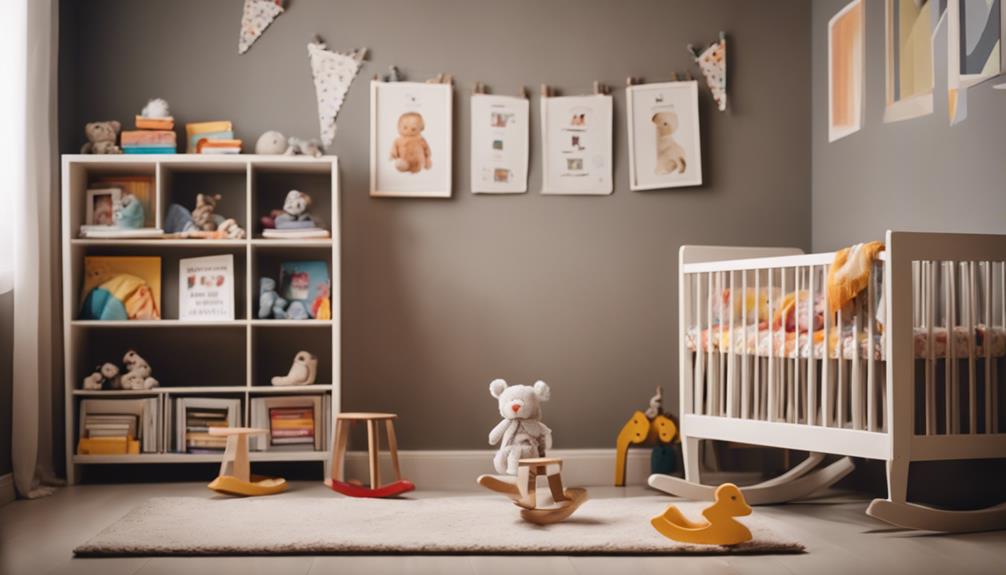
For newborns, selecting books with black-and-white illustrations can be highly beneficial for stimulating their visual development. These contrasting images are easier for babies to focus on and can help enhance their visual perception.
Chewable books are also a great option for little ones as they support oral sensory development and strengthen their tongues for speech development.
Interactive books with features like textures, flaps, and mirrors can engage multiple senses, sparking brain development in newborns.
Additionally, books with rhyming words and songs can make learning fun and enjoyable for babies.
Opting for board books that are durable and safe for babies to explore can encourage a love for reading from an early age. Remember to choose books that are age-appropriate and consider the interactive features that will capture your baby's interest and curiosity.
Reading to Babies: Age Guide
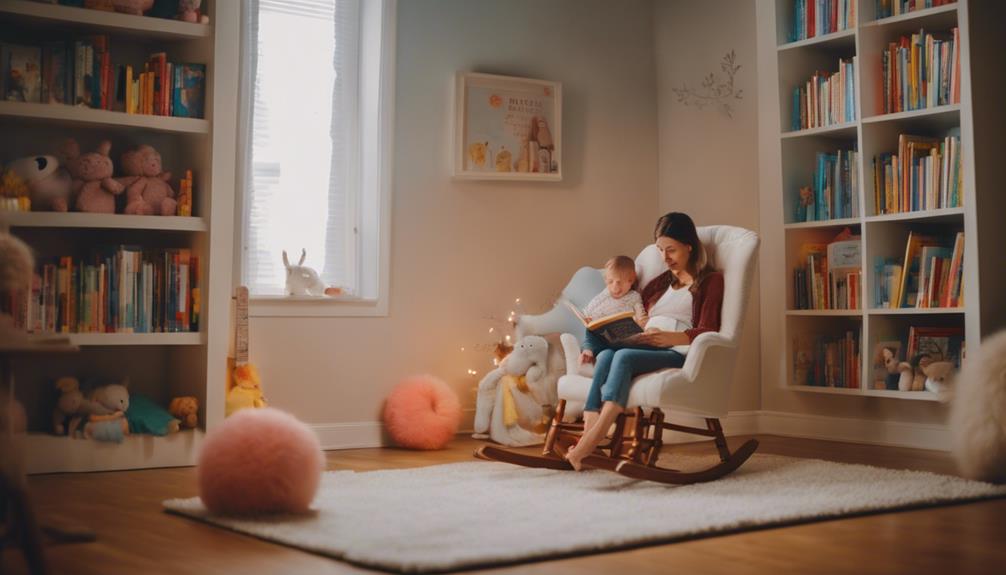
When it comes to reading to babies, choosing age-appropriate material is essential for their development. Experts recommend starting early, as reading to babies before their first birthday can have significant benefits.
Remember to select books with simple illustrations and interactive features tailored to your baby's age to make the most out of your reading time together.
Age-Appropriate Reading Material
Start with chunky board books and fabric books for infants to explore through their senses, aiding in their early development. As your baby grows, their preferences evolve.
Here are some guidelines to help you choose age-appropriate reading material:
- Infants (0-12 months): Opt for books with high-contrast images and simple patterns to capture their attention. These books help in stimulating their developing vision and cognitive skills.
- Toddlers (12-24 months): Introduce books with rhymes, repetitive phrases, and interactive elements like lift-the-flap or touch-and-feel features. These books can enhance their language development and keep them engaged.
- Preschoolers (24-36 months): Consider books with engaging plots, nonfiction stories about animals or everyday life, and books that encourage participation. These types of books can help in expanding their vocabulary and fostering a love for reading.
Benefits of Early Reading
Exploring the benefits of early reading to babies through an age guide can provide valuable insights into their cognitive and language development. Reading to babies at a young age plays an essential role in shaping their language skills and cognitive abilities. Early exposure to books not only enhances vocabulary but also fosters a sense of security and comfort. According to a study by the American Academy of Pediatrics, 'Reading to infants can have a positive impact on their emotional well-being and development of language skills.' Additionally, the sensory experience of exploring books aids in babies' understanding of the world around them. Through touching and mouthing books, babies engage in sensory development, further enhancing their cognitive skills. The more exposure to words babies receive through early reading, the better equipped they are for language acquisition and comprehension. Start reading to your baby early to lay a strong foundation for their future learning and development.
| Benefits of Early Reading | |
|---|---|
| Enhances language development | Fosters cognitive skills |
| Increases vocabulary | Promotes sense of security |
| Aids in sensory development | Facilitates understanding |
Starting Reading Habits Early
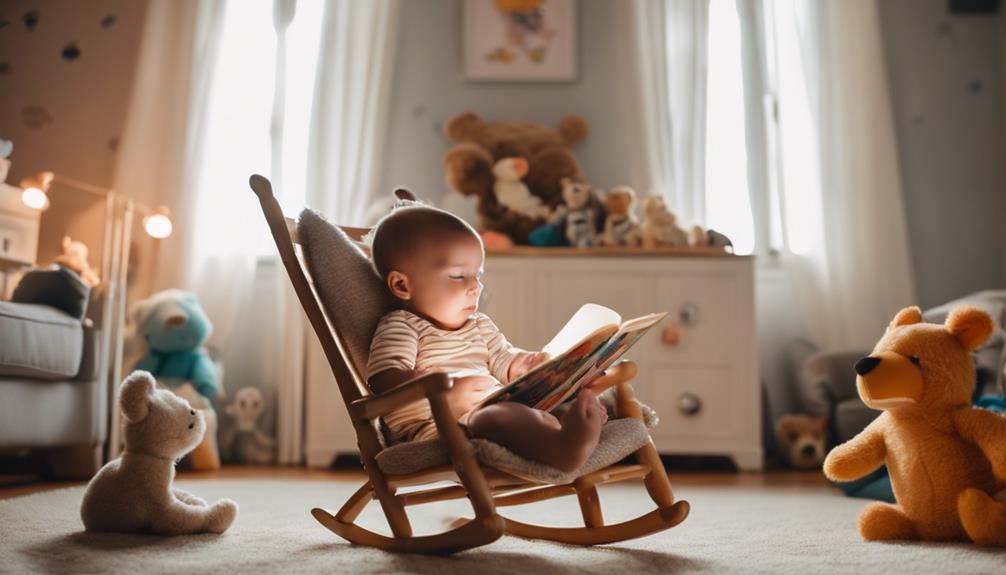
Begin fostering a love for reading in your baby from the earliest days of their life to support their cognitive development and language skills. Reading to your baby from their first days can have a noteworthy impact on their brain development and overall growth.
Here are three key ways in which starting reading habits early can benefit your little one:
- Enhanced Language Skills: By introducing books and reading into your baby's daily routines, you help them develop strong language skills. According to experts, early exposure to reading can greatly boost a child's vocabulary and comprehension abilities.
- Improved Cognitive Abilities: Reading to your baby from the start can aid in the development of their cognitive abilities. It can help with memory, problem-solving skills, and critical thinking, laying a solid foundation for their future learning.
- Long-lasting Impact on Literacy: Starting reading habits early can have a long-lasting impact on your child's literacy and love for books. Research shows that children who are read to from an early age are more likely to develop a lifelong passion for reading and learning.
Reading Activities for Toddlers
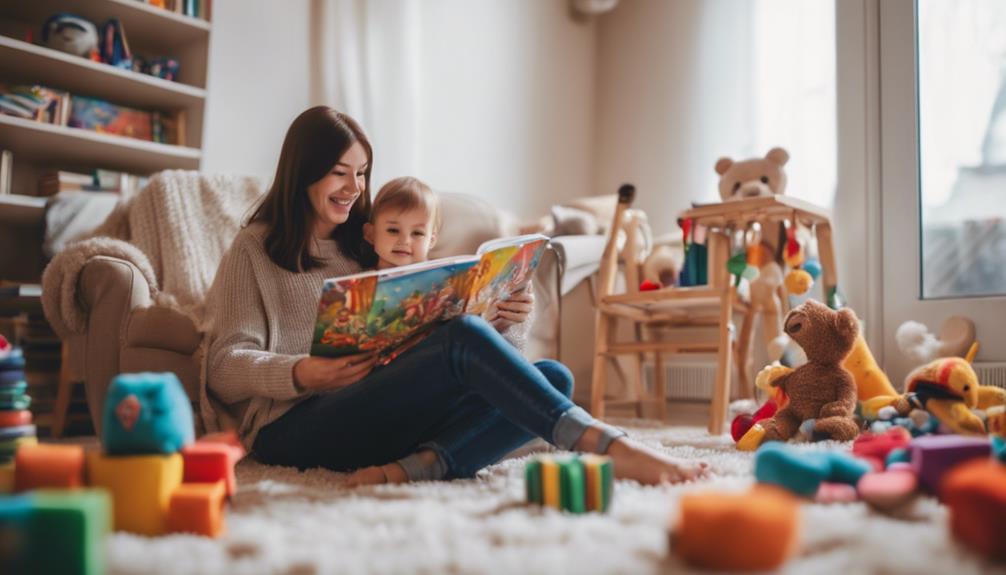
Enhance your toddler's cognitive skills through engaging reading activities that promote interactive storytelling and boost confidence. Encouraging toddlers to predict story events and engage in interactive storytelling can greatly enhance their cognitive development.
By letting them read from familiar books, you not only boost their confidence but also promote early literacy skills effectively. Relating story events to your child's own experiences can make reading more relatable and engaging for toddlers, fostering a deeper connection with the story.
Establishing reading routines with special rituals is important in creating a sense of consistency and excitement around reading time for toddlers. According to child development experts, these routines help in making reading a cherished activity for your child.
Additionally, personalized books featuring familiar faces and places can make reading more interactive and personalized for toddlers. This personal touch can further engage your child in the reading process, making it a more enjoyable and beneficial experience for them.
Raising a Young Reader
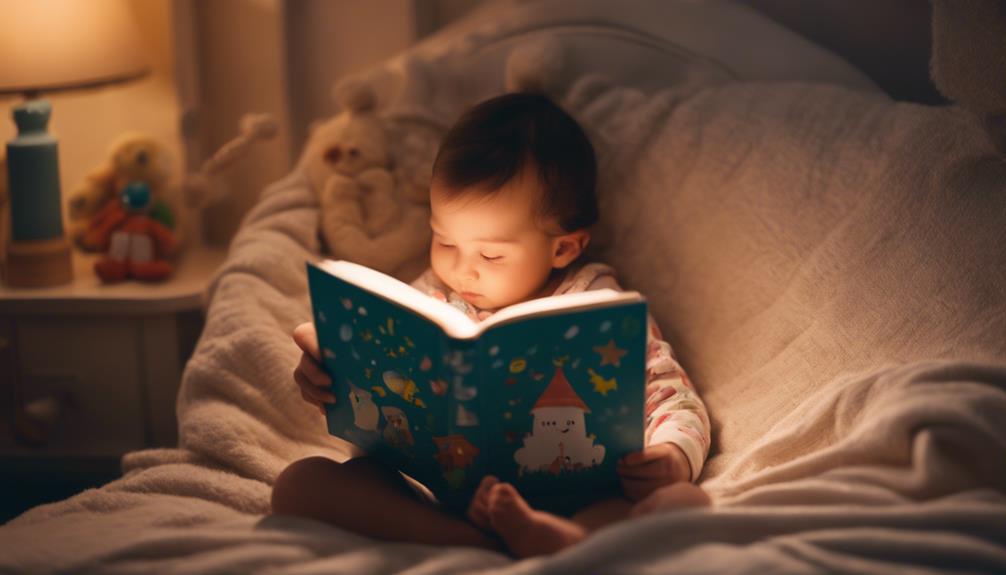
To raise a young reader, focus on establishing early literacy habits and incorporating a bedtime story routine.
Encouraging reading from a young age fosters a love for books and learning.
As you create a nurturing environment for reading, you lay the foundation for a future filled with literary exploration and academic success.
Early Literacy Habits
Starting early with reading activities is essential for instilling early literacy habits and raising a young reader. Here are three key benefits of engaging in reading activities with your baby:
- Language Development: Reading to your baby helps in laying the foundation for strong communication skills. According to the American Academy of Pediatrics, exposure to language through reading aids in brain development, supporting the baby's ability to understand and use language effectively.
- Vocabulary Expansion: Introducing books to your baby allows them to explore a variety of words and concepts, expanding their vocabulary. The National Association for the Education of Young Children emphasizes that reading activities provide opportunities for children to learn new words in context, aiding in language development.
- Cognitive Development: Engaging in reading activities with your baby stimulates cognitive development and curiosity. The Child Mind Institute states, 'Reading books with your baby helps build neural connections in their brain, encouraging curiosity and a thirst for learning.'
Bedtime Story Routine
Establish a calming and consistent bedtime routine by incorporating bedtime stories into your daily interactions with your baby. Reading to your baby before bedtime isn't just a routine; it's a way to promote relaxation and signal that it's time to wind down for sleep.
By including bedtime stories in your nightly routine, you aren't only strengthening the parent-child bond but also creating lasting memories with your baby. Additionally, this practice can instill a love for books and storytelling from an early age, contributing to your child's language development and cognitive skills.
According to the American Academy of Pediatrics, 'Reading with young children can improve their language, literacy, and social-emotional skills.' Thus, making bedtime stories a part of your bedtime routine can have long-lasting benefits for your child's development.
Frequently Asked Questions
When Should I Start Reading to My Infant?
Start reading to your infant as early as possible. Reading aids in brain development and language skills. Make it a part of daily routines like bedtime, using age-appropriate books with interactive features. Enjoy this bonding activity!
When Should I Start Reading to My Unborn Baby?
Before your baby is born, you can start reading to them for early brain development. Even if you begin later, reading has lasting benefits. Make it part of your routine with books that engage newborns.
When Should You Read When You Have a Baby?
Start reading to your baby as soon as possible. Reading promotes language development, early literacy skills, and parent-child bonding. Research shows benefits like faster language acquisition and long-term cognitive advantages. Make it a daily habit!
What Is the Earliest Age to Start Reading?
Hey, the earliest age to start reading is even before birth! Reading to your baby from day one helps their brain develop. So, grab a book and start exploring whenever you're ready.
Conclusion
To sum up, reading to your baby from a young age is essential for their cognitive development. Research shows that early exposure to books can have long-term benefits on a child's language skills and academic success.
By starting reading habits early and engaging in reading activities with your toddler, you're setting the foundation for raising a young reader.
Remember, it's never too early to pick up a book and share the joy of reading with your little one.


